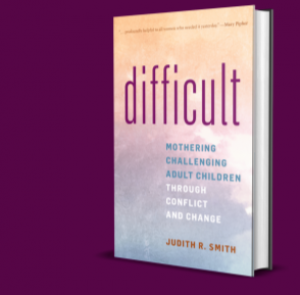 A therapist colleague got a call in the middle of the night from a mom in his practice. The woman was frantic. Her daughter’s anger had escalated into physical attacks. The mother had locked herself in her room – not knowing who to call. The friend asked me if I could recommend resources that he could give the family. He was familiar with my research and new book “Difficult: Mothering Challenging Adult Children through Conflict and Change” which will launch on February 2nd, Rowman & Littlefield.
A therapist colleague got a call in the middle of the night from a mom in his practice. The woman was frantic. Her daughter’s anger had escalated into physical attacks. The mother had locked herself in her room – not knowing who to call. The friend asked me if I could recommend resources that he could give the family. He was familiar with my research and new book “Difficult: Mothering Challenging Adult Children through Conflict and Change” which will launch on February 2nd, Rowman & Littlefield.
Difficult is the first book to speak to and name the experience of older mothers of troubled adult children who have become the default safety-net in the face of a failed mental health system, limited substance abuse treatment, and sky-rocketing rents. Little known face – the most likely perpetrator of what is called elder abuse is a dependent adult child living at home suffering with mental illness and/or substance use disorder. Vulnerable adults who cannot manage, or afford to, live on their own turn to their families. But the shared household arrangement often only benefits the adult child. Most cases of elder abuse do not get reported in part because older parents do not want their troubled adult children to go to jail.
My work is based on several years of qualitative research with older women (all over 60) who self-identified as having adult children whose problems were negatively impacting their quality of life. After analyzing their stories, I coined the name “difficult adult child” to capture the dilemmas that each of the women reported about the complex difficult mothering that emerged for them when their adult child who had returned home because they could no longer support themselves. The older mothers (and fathers if available) do not feel appreciated for the sacrifices they are making by re-opening their homes to their children later in life. Each mother shared with me her feelings of helplessness regarding the conflict whose needs take priority – mine or hers?
While this book will be extremely helpful to therapists and physicians who often do not sufficiently understand the stress that older parents with difficult adult children experience, Difficult is also written for the parents of challenging adult children. There are chapters on mental illness, substance use and family violence that offer accessible psycho-education and resources for getting help. This is a book you can suggest to your clients. It will help them see that they are not alone.
So many families who have adult children who are “off-time” in their development and/or engaged in deviant or stigmatized behavior, keep their adult children’s troubles secret and often blame themselves. The book is empathic to the terrible conflicts that parents feel when their adult child’s life is stopped by mental illness and/or substance abuse problems. Beyond allowing mothers and fathers to feel less alone, there are several chapters that offer readers a way to use the Stages of Change model applied to changingtheir relationship with an adult child; and there is a large section devoted to resources for self-care, getting social support, and staying safe.
Difficult is not about “boomerang kids” who will bounce back into independent living. Instead, the book shines a light on a large, usually unseen, population of parents who often feel that their adult children’s problems have no solution. The book presents the deep feeling of being “torn in two” that each woman is living with. Each felt that she had no choice but to support her adult child when they were in crisis and had invited them to move back into the family home. As clinicians, helping women see their problem as connected to other mothers and not a result of their unique failure in parenting can be empowering.
The book can be ordered on-line from your favorite on-line book seller.
Judith R. Smith, PhD, LCSW, is a senior clinical social worker, therapist, researcher, and professor at Fordham University. She is a leader in gerontological research focusing on women’s experiences as they age. Her book, “Difficult: Mothering Challenging Adult Children through Conflict and Change” Rowman & Littlefield, will be available Feb. 2022. Follow them on Twitter @JudithRSmithPhd


Comments 1
tom — February 23, 2022
i just love to read different articles, books and magazine. this is really interesting article. thanks for sharing this article.